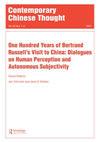Appendix: Reviews of Sinologism in International Journals
IF 0.4
3区 哲学
0 ASIAN STUDIES
引用次数: 0
Abstract
1. J. Hillis Miller, “Foreword” to Sinologism: An Alternative to Orientalism and Postcolonialism (London and New York: Routledge, 2013), pp. xiv–xix. 2. Jonathan Stalling, “Review of Sinologism: An Alternative to Orientalism and Postcolonialism,” Chinese Literature Today 3, no. 1/2 (2013): 177. 3. Martin J. Powers, “Review of Sinologism: An Alternative to Orientalism and Postcolonialism,” Journal of Asian Studies 73, no. 4 (2014). 4. Shaoling Ma, “Review for Sinologism: An Alternative to Orientalism and Postcolonialism,” Journal of Chinese Philosophy 41, no. S1 (December 2014): 770–774. 5. Gang Zhou, “Review of Sinologism: An Alternative to Orientalism and Postcolonialism,” Journal of Modern Chinese Literature and Culture (February 2015). 6. T. H. Barrett, “Review of Sinologism: An Alternative to Orientalism and Postcolonialism,” The China Quarterly 222 (June 2015): 585–587. 7. Steven Burik, “Review of Sinologism: An Alternative to Orientalism and Postcolonialism,” Philosophy East and West 65, no. 3 (July 2015): 997–999. 8. Zhou Xian, “Reflections on Reading Ming Dong Gu’s Sinologism: An Alternative to Orientalism and Postcolonialism,” Philosophy East and West 65, no. 4 (October 2015): 1273–1279. 9. Weihua He, “Who Owns China? Review of Sinologism: An Alternative to Orientalism and Postcolonialism,” Postcolonial Studies 19, no. 1 (2016): 254–258. 10. Viatcheslav Vetrov, “China’s New School of Thought-Masters (Xinzixue): An Alternative to Sinologism?,” Asiatische Studien— Etudes Asiatiques 70, no. 3 (2016): 731–755.附录:国际期刊汉学综述
1. 米勒(J. Hillis Miller):《汉学:东方主义和后殖民主义的替代》(伦敦和纽约:劳特利奇出版社,2013),页14 - 19。2. 史东林:《汉学检讨:东方主义与后殖民主义的替代》,载《今日中国文学》第3期。1/2(2013): 177。3.《汉学研究:对东方主义和后殖民主义的一种替代》,《亚洲研究》第73期。4(2014)。4. 马少陵:“中国学的反思:对东方主义和后殖民主义的一种替代”,《中国哲学》第41期。S1 (December 2014): 770-774。5. 周刚:《汉学检讨:东方主义与后殖民主义的替代》,《中国现代文学与文化》2015年2月号。6. T. H. Barrett,“汉学评论:东方主义和后殖民主义的替代”,《中国季刊》222(2015年6月):585-587。7. 柏立克:《汉学检讨:东方主义与后殖民主义的替代》,《东方与西方哲学》,第65期。3(2015年7月):997-999。8. 周宪:《对明东顾汉学的解读:东方主义与后殖民主义的一种选择》,《东方与西方哲学》第65期。4(2015年10月):1273-1279。9. 何卫华《谁拥有中国?》《汉学:东方主义与后殖民主义的替代》,《后殖民研究》第19期。1(2016): 254-258。10. 中国新学派思想大师:汉学的另一种选择?,《亚洲研究》,第70期。3(2016): 731-755。
本文章由计算机程序翻译,如有差异,请以英文原文为准。
求助全文
约1分钟内获得全文
求助全文
来源期刊

CONTEMPORARY CHINESE THOUGHT
Multiple-
CiteScore
0.10
自引率
0.00%
发文量
0
期刊介绍:
This wide ranging journal is essential reading for anyone who wants to understand the diverse themes and influences that shape Chinese thought today. It features translations of the most current and influential Chinese writings on all aspects of philosophical endeavor, from theoretical essays on systems to studies of China"s cultural and religious development, from interpretations of the Chinese classics to exegeses on Marxist thought.
 求助内容:
求助内容: 应助结果提醒方式:
应助结果提醒方式:


